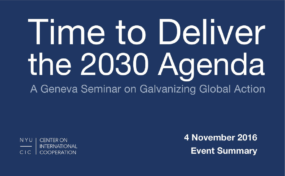Posted on 19 Nov 2021
The first follow-up meeting of the Kyoto Declaration offered a valuable opportunity for the exchange of experiences between government and civil society, and to create possibilities for further engagement to improve data on and responses to organized crime.
Between 10 and 12 November 2021, the UN Commission on Crime Prevention and Criminal Justice (CCPCJ) hosted its first intersessional thematic discussion to follow up on the implementation of the Kyoto Declaration, which was adopted at the 14th UN Crime Congress in March 2021. The Declaration contains commitments and measures that governments should deploy as part of their crime prevention and criminal justice efforts. When it was adopted, the GI-TOC was critical of the downgraded role for civil society in the declaration and lack of appreciation of the real challenges of organized crime.
The November meeting included a broad range of speakers from the United Nations Office on Drugs and Crime (UNODC), governments and international organizations, who presented a wide range of crime prevention and criminal justice responses. However, there was little discussion of why organized criminal markets have boomed over the past 20 years since the adoption of the UNTOC.
Nevertheless, the meeting did offer a rare opportunity for civil society to engage with state and intergovernmental organizations’ representatives. If the thematic discussions continue along a similar vein in future, the meetings could become a valuable platform for exchange between governments and civil society.
Space for engagement
The range of civil society speakers, coordinated by the Alliance of NGOs on Crime Prevention and Criminal Justice, was diverse, with global organizations represented alongside local initiatives. Anna Alvazzi del Frate, the Chair of the Alliance, was one of several speakers who outlined the importance of gender-sensitive crime prevention and criminal justice policies, and of multisectoral engagement in understanding gender issues.
Another speaker who highlighted the need for a gender and youth perspective on organized crime prevention was Judy-Ann Cilliers of MathMoms, a community-based organization in Cape Town, South Africa, which builds resilience to organized crime through mentorship and education programmes in communities vulnerable to gangs.
With a focus on the economic dimension of crime, Antonio Balsamo, President of the Court of Palermo, explained how communities and civil society work with the government to make use of seized mafia assets for the public good. Jay Albanese, representing Criminologists Without Borders, emphasized the need for greater use of academic and civil society research and analysis in the formulation and implementation of international responses to organized crime.
But in order to share data and build working relationships on these issues, more trust and meaningful engagement is ultimately going to be needed between governments and civil society. State data on its own usually does not reflect the real challenges of organized crime for local communities, and civil society can play an important role in filling the knowledge gap. As highlighted by an INTERPOL representative, tools such as the Global Initiative Against Transnational Organized Crime (GI-TOC)’s Global Organised Crime Index can be used to inform crime threat assessments.
A common agenda
As the process to follow up on the implementation of the Kyoto Declaration continues, more engagement between government and civil society stakeholders should be a key objective and serve as an example for other organized-crime-related UN processes – such as the UN Convention against Transnational Organized Crime (UNTOC) implementation review mechanism, the UNTOC substantive working groups – in which civil society is unfortunately still not allowed to participate – and the upcoming negotiations on cybercrime beginning in January 2022.
Members of civil society organizations around the world who work to prevent and counter organized crime and mitigate its damaging effects continually face threats and violence, and even risk being murdered, as documented in the GI-TOC’s database of global assassinations, the Assassination Monitor. And in recent years, they have faced an increasingly shrinking space for engagement at the UN, exacerbated by the COVID-19 pandemic. Now, as the UN Secretary-General himself has urged, it is more important than ever that the Kyoto Declaration follow-up process provides an opportunity for member states and the UNODC to build trust with civil society, which could lead to better data-sharing practices and improved multi-stakeholder responses to organized crime.



